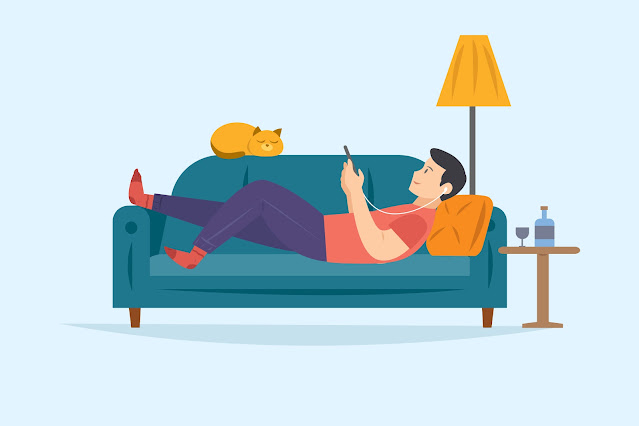Relaxation Techniques - Clean A Mind
Relaxation techniques can help reduce stress and improve overall well-being. Here are a few techniques you can try:
Deep breathing: Take slow, deep breaths in through your nose and out through your mouth. Focus on the sensation of the air moving in and out of your body.
Progressive muscle relaxation: Tighten and relax different muscle groups, starting with your toes and working your way up to your head. As you tense each muscle group, take a deep breath in and exhale as you relax.
Meditation: Find a comfortable seated position and focus on your breath or a mantra. When thoughts come up, acknowledge them and let them go, returning your focus to your breath or mantra.
Yoga: This physical practice combines movement, breath, and mindfulness to relax the mind and body.
Massage: Receiving a massage can help relax tense muscles and reduce stress.
Nature: Spend time in nature and take in the sights, sounds, and smells around you.
Music: Listen to calming music or sounds, such as ocean waves or rain.
Creative activities: Engaging in activities such as coloring, drawing, or painting can be a relaxing outlet for stress.
I hope these techniques are helpful! If you have any specific questions or concerns, don't hesitate to ask.
Setting goals and working towards them can be a helpful way to improve well-being and increase self-esteem. Here are a few tips for setting and achieving your goals:
Make your goals specific and achievable: Rather than setting a general goal like "lose weight," set a specific goal like "lose 10 pounds in 3 months by exercising 3 times a week and eating a healthy diet."
Set achievable deadlines: It's important to set a timeline for your goals to help you stay motivated and on track.
Break your goals into smaller steps: Breaking your goals down into smaller, more manageable steps can make them feel more attainable and help you make progress.
Keep track of your progress: Regularly reviewing your progress can help you stay motivated and make adjustments to your plan if needed.
Celebrate your successes: It's important to celebrate your achievements, no matter how small. This can help boost your self-esteem and motivate you to keep going.
Don't be too hard on yourself: If you don't reach your goal on time, it's important to be kind to yourself and make any necessary adjustments. Remember that setbacks are a normal part of the process.
I hope these tips are helpful! If you have any specific questions or concerns, don't hesitate to ask.
Self-care is the practice of taking care of one's own physical, emotional, and mental well-being. It's important to prioritize self-care in order to maintain good physical and mental health. Here are a few ways to practice self-care:
Eat a healthy diet: A balanced diet can improve physical and mental health.
Exercise regularly: Physical activity can improve mood, reduce stress, and boost self-esteem.
Get enough sleep: Poor sleep can affect mood, memory, and cognitive function. Make sure to get enough restful sleep each night.
Practice relaxation techniques: Techniques such as deep breathing, meditation, or progressive muscle relaxation can help you relax and reduce stress.
Take breaks and practice self-compassion: It's important to take breaks and be kind to yourself when you're feeling overwhelmed.
Seek social support: Connecting with others can improve mental health and reduce feelings of isolation.
Engage in activities you enjoy: Doing things you enjoy, such as hobbies or spending time with friends and loved ones, can help improve your overall well-being.
Seek professional help if needed: Don't be afraid to reach out to a mental health professional if you're struggling.
I hope these tips are helpful! If you have any specific questions or concerns, don't hesitate to ask.
Engaging in activities you enjoy can be a helpful way to improve well-being and boost self-esteem. Here are a few tips for finding activities you enjoy:
Reflect on your interests: Think about the things you enjoy doing or have always wanted to try. This could be anything from hobbies and sports to creative pursuits or volunteering.
Experiment with different activities: Don't be afraid to try new things. You never know what you might enjoy until you give it a chance.
Find activities that challenge you: Engaging in activities that challenge you can help you feel a sense of accomplishment and boost self-esteem.
Make time for activities you enjoy: It's important to prioritize activities that bring you joy and make time for them in your schedule.
Find a balance: While it's important to engage in activities you enjoy, it's also important to have a balance and make time for other responsibilities and commitments.
Finding balance in life can be challenging, but it's important for both physical and mental well-being. Here are a few tips for finding balance in your life:
Prioritize your responsibilities: Make a list of your responsibilities and prioritize them based on their importance and urgency. This can help you manage your time and focus on the most important tasks.
Set boundaries: It's important to set boundaries with your time and energy, and to say no to commitments that are not aligned with your values or goals.
Make time for self-care: It's important to make time for activities that nourish your physical, emotional, and mental well-being, such as exercise, relaxation, and social connections.
Find balance in work and leisure: It's important to find a balance between work and leisure activities, and to make time for rest and relaxation.
Seek support: Don't be afraid to ask for help if you're feeling overwhelmed. Seek support from friends, family, or a mental health professional if needed.
Limiting distractions can be helpful for maintaining focus and clarity of thought. Here are a few ways to limit distractions:
Turn off notifications on your phone or computer. This can help prevent alerts from interrupting your work or concentration.
Find a quiet place to work. If you can, find a place where you can work in peace and quiet, without any background noise or interruptions.
Use noise-cancelling headphones. If you can't find a quiet place to work, or if you are in a noisy environment, noise-cancelling headphones can help block out external noise and distractions.
Set boundaries with others. Let people know when you are working and that you need to focus. Consider setting specific times when you are not available to be interrupted.
Use time blocking to focus on one task at a time. Rather than trying to multitask, try to focus on one task at a time. Set a specific amount of time for each task, and try to avoid switching between tasks too frequently.
Take breaks regularly. It's important to take breaks to give your mind a rest and recharge. Step away from your work for a few minutes every hour or so to stretch, take a walk, or do something relaxing. This can help you return to your work with renewed focus and clarity.



